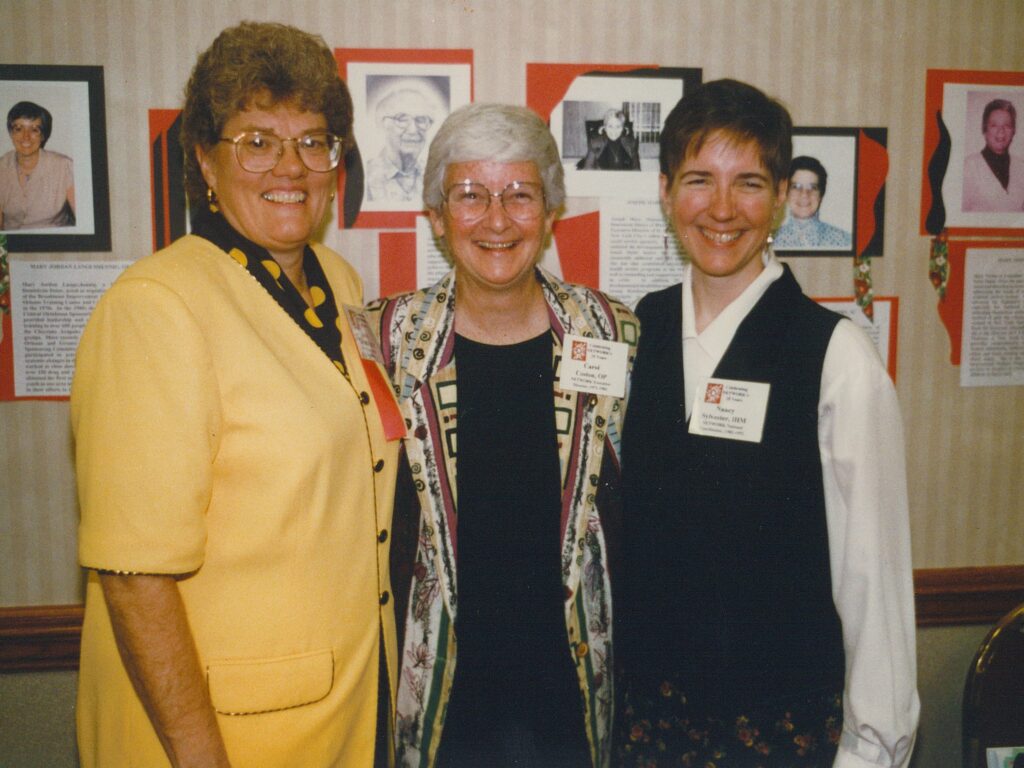
What We Can Do
Persistence Under Adverse Conditions is Essential for Seeking Justice
Dr. Mara Rutten
Jan 12, 2023

Sr. Carol Coston, OP (center), Sr. Nancy Sylvester, IHM (right), and Sr, Kathy Thornton, RSM (left), served as NETWORK’s first three directors, their tenures spanning the first 30 years of the organization’s existence.
My community recently watched the 2019 Oscar-winning film “Jojo Rabbit,” the story of a young German boy growing up in the last year of World War II. In one scene, Jojo and his mother pass through the public square, where Nazis had recently hanged members of the Resistance.
“What did they do?” Jojo asks her.
She answers, “What they could.”
For those of us who strive for justice in this world, elections can be both inspiring and terrifying, especially when the two main parties refuse to work together. As the House changes hands, we are rightly concerned about what will become of the issues that animate NETWORK’s Build Anew policy agenda: dismantling systemic racism, rooting our economy in solidarity, building inclusive community, and transforming our politics. But whether Congress champions or stymies them, we must carry on, and do what we can.
NETWORK has been in this place before. Although early on it enjoyed the ear of both major parties, that moment was short-lived. Starting with Ronald Reagan’s election in 1980, it faced the dilemma of how to lobby “in a milieu in which basic assumptions and values were increasingly alien to ours.” How it persevered through decades of opposition to its mission can be instructive on how to work steadfastly for Catholic Social Justice and the common good in adverse political climates.
Reagan’s approach to cutting programs he didn’t like was to defund them. In his first year, he introduced no new initiatives other than the budget, which drastically cut domestic spending. In this way, he could avoid going through the legislative process, which allowed for public debate about the merits of these programs.
With the regular channels of debate cut off, NETWORK turned to the field, where sisters and social workers could testify to the hardships people were experiencing. It provided members with lobbying kits to help mobilize communities and provide Congress with the much-needed perspective on how its policies affect those in need. It also partnered with 175 organizations to highlight that perspective in a week of HOUSING NOW! events to address rising homelessness.
Despite having a friend in the White House, the 1990s were just as difficult. The GOP’s “Contract with America” promised to shrink government by way of cutting social programs, specifically welfare. The suggested cuts were “mean-spirited calling for harsh, punitive measures for poor women and their children.” Again, NETWORK’s impact was dulled when Congress bypassed traditional hearings, shunting aside organizations protesting its agenda.
“Denied clearance to stand outside House and Senate chambers – where the most effective floor lobbying takes place,” it joined with Pax Christi and several women’s religious congregations to form the Welfare Reform Watch Project. Collecting statistical and anecdotal information about the effects these cuts had on people’s lives, they issued a paper in preparation for a Lobby Day “to insist that welfare reform is about getting people out of poverty not just off welfare.”
George W. Bush also took on social spending under the guise of “compassionate conservatism.” Bush, an evangelical Christian, summed up his governing philosophy by noting, “It is compassionate to actively help our fellow citizens in need. It is conservative to insist on responsibility and results.” This would mean encouraging people to build better lives for themselves without government assistance and to expand responsibility for federally funded programs to religious and community organizations.
NETWORK cautioned that the “proposal implies that individual conversion of ‘morally flawed’ people is the answer to society’s ills, including poverty. This disregards government’s role in shaping social and economic structures that keep people poor” and would enable the government “to abdicate its larger responsibility to protect the rights of the individual and promote the common good.”
Insisting on the government taking responsibility for the welfare of all its citizens is a tenet of Catholic Social Teaching and the thread that has run through NETWORK’s 50-year history. The first Nuns on the Bus tour promoted resistance to Rep. Paul Ryan’s harmful budget, and our members and staff have continued to engage in lobbying and organizing efforts on behalf of such issues as fair tax policies, immigration reform, Medicaid expansion, and reparations.
There have been both wins and losses, but we continue to do the work because we know that the U.S. government’s time is not God’s time. Until our dreams of a just and equitable society come to fruition, we do what we can.
Dr. Mara Rutten is a candidate with the Sisters of Mercy of the Americas and NETWORK’s historian.







